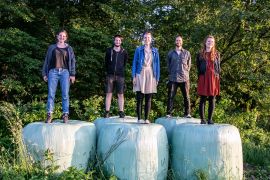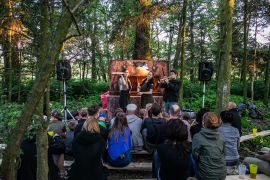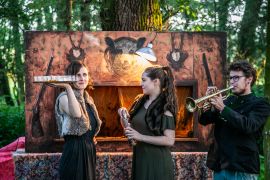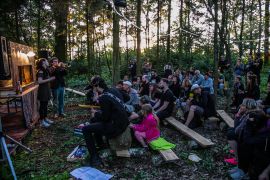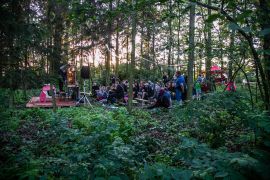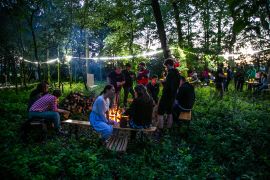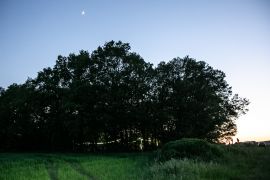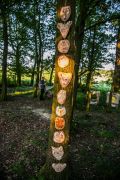They call themselves Zvěřinec (Menagerie) and all of them are natives to the Zlín region. Although they appeared on the scene not long ago, they are already very accomplished.
A conversation about the wish to shift alternative culture out of the centers and into the countryside, and about youthful energy and its pitfalls, took place in the thickets and surrounding woods of the village of Lukov, during the event Celebrate the Thickets, which took place 8 June, 2019, organized by Zvěřinec. We make use of a late-afternoon break between authors’ readings and a theatre performance to sit before a burning fireplace with the five members who form the core of the group Zvěřinec, namely, the scenographers Jan Tomšů and Vendula Bělochová, producers Jakub Janča and Magdalena Petráková, and the animator Lenka Trantírková.
What were the motivations that brought you together, and how did you come up with the name Zvěřinec?
Honza: Kuba and I used to meet in Prague and were trying to decide what we might do apart from our studies and apart from work. So we came up with the idea of organizing a DIY go-cart race in Lukov, a small village outside of Zlín, where I am originally from. Our first event was called the Lukovská Jizva (“The Lukov Scar”) and took place in October 2017.
Vendy: After the Lukov Scar event, we decided that we would like to conceptualize a year’s worth of programming, and to have a long-term presence in the Zlín region. We live and work in Prague, but we all eventually want to move back to Moravia. We were born here. We all also work in the sphere of culture, and so we asked ourselves what would we do, considering that we want to come back. Up until now, our culture here has been in bad shape. If we want something done about it, we must do it ourselves.
Honza: I like coming back to the region, but the lack of culture is huge. Bands and theater groups stopped coming to the Zlín region, as there are no suitable spaces or venues to accommodate them. The Drak theater regularly comes to Kroměříž and Prostějov, but they don’t drive the extra 30 km to Zlín. And it’s the region’s capital! There should be some space here for contemporary fine art, theater, or bands.
Kuba: Regarding the name, we thought about it a long time. Zvěřinec (Menagerie) evoked a sense of the wild, but also a certain cuteness which might be interesting to children. It is supposed to be a diverse group of people which can continue to grow and expand. The five of us are currently the core team, but many friends also help out with each event we organize.
How can you organize yourselves “long distance”?
Kuba: We have experience from other cities and from abroad. We have been active for a long time in the cultural sphere. But that first race we organized was a surprise because of the locals’ interest and positive reactions to it. They helped out themselves, making posters for example. That was a fresh impulse for me.
Magda: I organize a festival in Luhačovice, and do production in Olomouc, but I still felt a certain debt to my native region of Zlín. Zvěřinec came about naturally. I wanted to help getting culture and art out beyond the cities. For me, this is much more authentic and rewarding at the same time. I work in Olomouc, where it is very hard to really do something surprising anymore, and it is even more difficult in Prague. But here, there are many opportunities. It is great, being a part of something where people, often for the very first time, come in contact with alternative music which they may have even been afraid of before. Or to see them at a performance of DAMU students which they had never had an opportunity to see. It is at the same time a very sensitive moment as it is easy to alienate people right from the start. We think about the dramaturgy a lot, and it is a real challenge for us.
Vendy: We try to include the locals, so that they consider the events their own. We don’t want to be a group of people from the outside who come and organize things. I don’t know if they would have even come, if they hadn’t known us from before. Just yesterday, some people helped us trim and clean the bushes around here, and they took part in the food competition too.
How do you bridge the initial distrust?
Honza: We can be doing something which we consider genius, but that might just work to alienate the locals, because they might not see it the way we do. We try to find the overlap with what we want to do, and we try to cater to the local context, one which might be very different from how the invited projects were actually developed. We also try to work across generations, and we do programs for children and adults, and invite the people from the local senior homes to each event we do. Basically, it worked out that the Lukov Scar event brought artists, actors and musicians in contact with local makers, and together they worked on preparing a program or on building the go-carts. We really think a lot about how we mix things.
What did you come up with? What is in the Menagerie magic potion?
Magda: We keep troubleshooting it. This time last year we held a similar event at Lake Bezedník. We invited a wide spectrum of musicians, from polka music to noise, and also included a guided tour around the lake, and also got the local children’s theater involved. It was a hodge-podge where everyone, including us, found something new to their liking.
Honza: It consists of a careful mix of what we like and of what the local artists have to offer. They must however always be good. Authorial readings by Irena Knedlová and Václav Zimmermann, which just ended a minute ago, offer a great example of our approach to dramaturgy.
Vendy: Yes, the two local literati, Mr. Zimmermann from Provodov and Ms. Knedlová from Podkopná Lhota, are both great. This is the level of quality we would like to have. We could bring them anywhere, but we have the good fortune that they are locals of the region.
Kuba: Our second line of activities takes place in Zlín. There, we can afford to do more, as the audience is more experienced, but there are other challenges for us. Bureaucratic challenges, such as getting authorization to do an event in a park or make a procession from one place to another is quite demanding.
How has the cooperation with the Zlín municipality been going so far?
Kuba: So far, it has been good. They support us financially and in terms of media exposure, and we have only been on the scene for a bit over a year.
Do you see any deficits in how the municipal government works? Why is the Zlín region in this regard still underdeveloped?
Honza: The institutions which did support alternative culture were not supported. It was partly due to municipality politics, and partly due to their own decisions, as they didn’t want grants, and so it fell by the wayside. It may also have been due to outside influences, as was the case with the Golem club, where all the bands used to play. That place was bought out by Senator Ivo Valenta, the owner of Sinot and the founder of Parlamentní Listy, and he closed it down in 2014.
Kuba: And we hear this also from the theaters and bands themselves: they say that when they go from Hradiště to Ostrava, they don’t even stop in Zlín, as there are no places that would have them.
Magda: It is changing though. Zvěřinec hadn’t even been around for a year when we got an invitation to co-create the conception of cultural life in the city of Zlín. The city also allocated five million CZK to a participatory budget, for which various proposed projects competed, including our Art Pavilion project. We got shortlisted and, although we ultimately didn’t win, we gained some exposure. And now, they approached us to send it over to them again.
Vendy: Many things are changing on the local level, and we get the feeling that we could be a part of that. This is the time and place, and the chance to do it.
Magda: We can’t really compare as to how it used to be, but I know how it is in Olomouc now. We are slowly wading our way into the current structures, and I get the feeling that it is even better in Zlín. There are specific persons whose only job is PR, for example. The coordinator for the participative budget, Ms. Kamila Gamelová, is a young woman with whom communication is very easy. And there is Jana Kubáčová from Živý Zlín. We currently have some great partners to work with.
Are you trying to get your own space in Zlín?
Honza: Yes, that is our nearest short-term objective. During the summer, we want to put together a proposal, and to find a place. It should be an independent, multi-functional space for alternative theater, music, a shared workshop, and a space for artist residencies.
Vendy: Honza and I work in theater, and we see that Zlín simply lacks any suitable space for alternative theater. We are starting collaboration with Nová Síť and we have a plan to feature the Malá Inventura v Regionech festival in Zlín.
Magda: And they approached us from the Regional Gallery with the offer to help them fill the café space which they are looking to develop further.
What do you need the most right now?
Vendy: We need to concentrate, or do some team-building holiday. (Laughs.)
Honza: We need to sort out our priorities and divvy up our roles better. We have an intuitive understanding of what we are doing, but we need to have more structure, and to sort out our ideas. We have it all in our head, but we kind of don’t know how to move ahead from that.
Kuba: And we also need to build up more trust with the locals.
Magda: And finances. We could buy a circus tent. And reusable cups. Technical equipment. Things which we could further rent out for nominal sums to other like-minded organizers. And we wouldn’t have to go about procuring the same things we need every time we hold an event.
Vendy: And money for the artists. We would like to be able to pay them.
On what level is your fundraising currently?
Vendy: Well, I went to a seminar on the topic. (Laughs.)
Honza: So far, it’s pretty wild and random.
Magda: The city of Zlín has so far supported each of our events. These are of course small budgets we work with. They give us 70%, and we have to find the rest elsewhere.
Vendy: It is much worse at the regional level, as there is much more administration there.
Honza: For local events, like Lukov or next week’s Provodov, we get much support from the communal level – both financial and material. They lend us many things. Lukov has an enlightened mayor who helps us as much as he can. He, for example, helped us manage and speed up the authorization from Czech Forests to host this Bush Festival.
Which associations do you favor? Do you draw inspiration from somewhere?
Vendy: Definitely the Roztoč association in Roztoky u Prahy where some of our friends from DAMU are active. We gradually started discovering what they have in fact been doing all these years. The association has been active for twenty years as it was their parents who founded it. They managed to build a robust network among the locals. The whole town takes part. They have wonderful workshops for children. Due to this, the town has developed a wonderful social climate, interesting people are moving in, something is always happening. We used to visit there with Honza, and we became enamored with it. We want to do something similar here, but they spent twenty years developing it.
Magda: We take a bit from everything. I like the approach of Jitka Jakubíčková from Zauhlovačka [editor’s note: a 2017 Perpedes grant recipient]. Or that of Markéta Málková from Komařice’s Rezidence v Lese. Or Alta in Prague – that is a model of what a space should be like so that a person feels welcome there. It is a mosaic of valuable input.
And do you collaborate with anyone here in the Zlín region?
Honza: We have mostly established connection with the Zlín-base Hukot. For me, they were an initial group of people who, when I was a teen and needed it most, provided a dose of contemporary culture. They did interesting things, like video-mappings, which are still the best I have ever seen. They really pushed the boundaries of contemporary art, and were very good at it. But their intent was not to create a community. I still draw on that experience. They’re still going strong.
So the Zlín region is not so secluded after all?
Kuba: Hukot, for example, still do their own thing, but they also curbed their production. They are of the older generation, have families now, but they support us. They are in attendance here as well.
Honza: Then other associations started contacting us, ones we didn’t even know about. Like Ničení Ticha (Destruction of Silence). Or the independent radio Svit Zlín. Horem Dolem from Provodov. Luhovaný Vincent. And large festivals like the Olomouc-based AFO and PAF. We grew up on these events, and we still work on them to this day.
Kuba: And we could add Litr Olomouc or Divadelní Flora. These festivals had taught us one important thing: if there is an event that you want to do, just do it. This is the reason we went ahead and organized the Lukov Scar, and why we started Zvěřinec. Because we want to do it, we enjoy it, and we do it ourselves. I get personal satisfaction from knowing that from a budget which is a miniscule fraction of many other, commercial events, we can make some three hundred people quite happy.
Honza: It’s very similar for me. I enjoy what we do very much. I love dragging the cables through the forest for no money, driving a van, and not getting any sleep at night. That’s my lifestyle and it makes me happy. It’s an adrenalin rush, one which you can always take a bit further. We do an event in a forest where there is nothing. But it is also an investment in the future, as we put together a community of people who are interested in the same things. If I live here eventually, I won’t just have the local pub to go to. These events bring together people who would otherwise never meet; people who share interests, but are otherwise unknown to each other.
Vendy: I want to live in this place, and I want that life to be good. I enjoy the occasions where people can meet other like-minded people. And this is what is springing up here. Another reason is that we live by theater and culture, we enjoy producing it and spreading it further. I believe that this country needs to bring the open-minded people and open culture to the regions. We can’t just stay in Prague. So we try to create those opportunities. Honza and I both study Alternative and Puppet Theater at DAMU, we are both scenographers and we see how the network of opportunities in Moravia is very sparse, compared to Bohemia.
Magda: And apart from that, we are living proof that cultural events can easily be done everywhere, like this event here. We push the boundaries of the possible. In a forest, without electricity. And I also like the work with children.
Léňa: I was thinking a lot while you guys were talking. With Zvěřinec, I am trying to cure the frustration of being in a state-funded organization. I like the cultural and community-oriented feel of it. I am also learning that culture can be done without any needless pomp. And it is also a pleasant way to work with the public and to build relationships among people. Today, some old grandmother from Zlín came for the readings – she listened, and then she took the last bus back.
Vendy: We should have offered her a ride.
How do you organize yourselves? How do you make decisions?
(Everyone laughs.)
Kuba: We are still figuring it out. Each of us does what they can, and we do Zvěřinec after work. The team-building holiday helps. So far we had just one. We closed ourselves off in Všenory in a house, and we plan to do it again this Summer.
Vendy: Although each of us lives elsewhere, we don’t have the slightest problem to get on a train and meet up somewhere. We meet each other at festivals where we work, and there we resolve the details of the upcoming events.
We are like:
- A throng which came together spontaneously and is open to accept new people
- A pack which knows how to cooperate
- A herd which knows where it is going and what it wants; it understands its mission
- A unit which is able to orient itself in the terrain
- A group which is coordinated and has the needed know-how
- A swarm which observes the outside world and seeks out inspiration
- A flock which sticks together and where everyone is equal
Jan Bartoš
